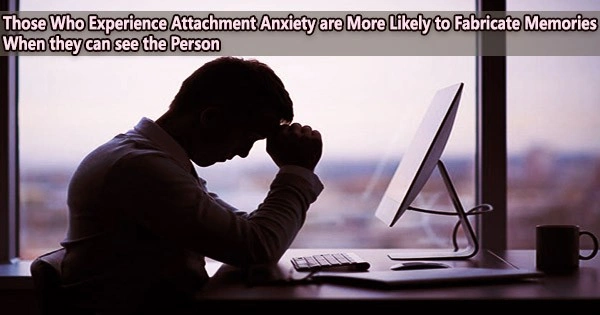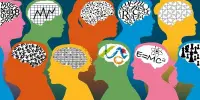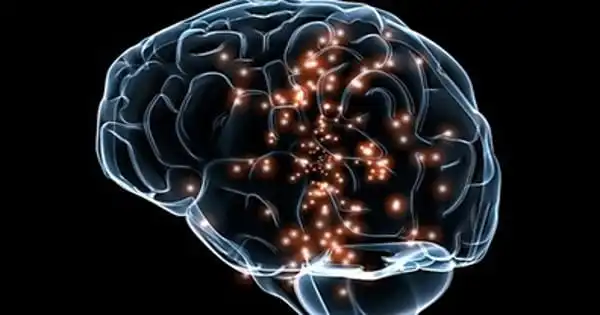According to a recent study, those who constantly worry about being abandoned or rejected by those closest to them are more likely to recall erroneous information when they can see the source of the information.
The authors, SMU’s Nathan Hudson and Michigan State University’s William J. Chopik, found that adults with attachment anxiety tend to remember details incorrectly more often than people with other personality types, like neuroticism or attachment avoidance.
According to a study published in the Journal of Personality and Social Psychology, attachment-anxious people were more likely to get the facts wrong only when they could see the person delivering the information rather than when they read or heard the same information.
A 20-minute film of a lady discussing either her tumultuous breakup with a guy or another subject, such as a shopping trip or the ecology of California wetlands, was shown to some study participants who were randomly assigned to do so.
Other participants got the same information from audio only or by reading a transcript. Regardless of how the information was presented, all groups conducted a memory test right away.
Hudson, a psychology professor at SMU (Southern Methodist University), said seeing the speaker might be a factor in memory distortion because highly attachment-anxious people tend to be hypervigilant in monitoring facial expressions. They also tend to misjudge the perceived emotional states of others, he said.
“We believe that highly attachment-anxious individuals are likely intensively analyzing what is being said in the videos we showed them,” Hudson said. “Their own thoughts and feelings about the video may have gotten ‘mixed up’ with the actual video contents in their minds. Thus, they experienced false memories when we gave them a test regarding the video’s contents.”
These findings, Hudson said, illustrate how our personalities can potentially affect our memory abilities.
“It’s important to understand that our brains don’t store verbatim audio or video clips of events that happen to us,” he said. “Instead, our brain stores snippets of information about our experiences, and when we attempt to recall a memory, it combines stored bits of related information and makes its best guess about what happened.”
We believe that highly attachment-anxious individuals are likely intensively analyzing what is being said in the videos we showed them. Their own thoughts and feelings about the video may have gotten ‘mixed up’ with the actual video contents in their minds. Thus, they experienced false memories when we gave them a test regarding the video’s contents.
Nathan Hudson
“As you might imagine, this process can be quite error-prone,” he said.
A potentially intense feeling, attachment anxiety relates to how people form relationships. According to Hudson, people with high levels of attachment anxiety frequently feel they are unworthy of love and care, worry constantly that others will reject them, and spend a lot of time overanalyzing their relationships.
Childhood relationships with parents or other primary caregivers that are inconsistent frequently lead to the development of attachment anxiety. Frequently, it carries on into adulthood.
Past studies have demonstrated that a person’s attachment style can predict how likely they are to forget certain details, particularly those that are connected to relationships. The Journal of Personality study, however, is among the first to demonstrate that attachment anxiety renders people more likely to falsely recall facts or events that never happened.
Attachment anxiety leads to false memories not just about relationships
Hudson and Chopik, an associate professor of psychology at Michigan State University, came up with the findings by conducting three separate studies with college students. The number of study participants varied from 200 participants to more than 650.
Research on these individuals revealed that regardless of whether the subject was a relationship breakup or something utterly impersonal, people who were extremely attachment-anxious were the most prone to developing false memories when seeing a video of a person.
However, the study shows that after reading or hearing the identical things, they remembered them more precisely than persons who had lower attachment anxiety scores.
Chopik and Hudson compared the attachment-anxiety adults with people who had one of the Big Five personality traits, such as neuroticism or extraversion. They were contrasted with individuals who scored highly in attachment avoidance. Relationships are avoided by avoiders in order to avoid emotional intimacy and potential harm.
To determine the attachment style of the college students, the researchers employed the nine-item Experiences in Intimate Relationships Relationship-Structures questionnaire. Everyone who is single was asked to reflect on their most recent romantic relationship or on relationships in general.
Those with high levels of attachment anxiety tended to strongly agree with statements like “I often worry that my romantic partner doesn’t really care for me.” Meanwhile, people who were highly attachment-avoidant strongly agreed with statements such as “I prefer not to show my romantic partner how I feel deep down.”
How attachment-anxious adults can break the cycle
Hudson said students who recognize themselves as being attachment-anxious may derive immediate personal benefit from this study by being aware of interpersonal situations where they are likely to experience false memories for example, during online or in-person lectures, conversing with classmates and friends or watching political debates.
For those who have an attachment-anxious relationship type, supplementing information gained during face-to-face interactions with reading and listening activities can probably increase memory accuracy.
The majority of people, according to Hudson, want to control their attachment anxiety, and therapies may be able to achieve just that, enhancing their wellbeing. His findings show that adopting a more secure attachment style may potentially have a good impact on memory functions, and he advises further investigation into this.















